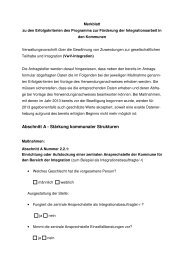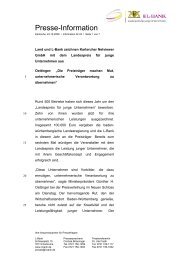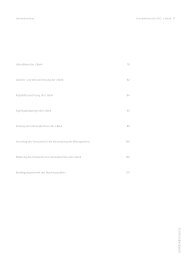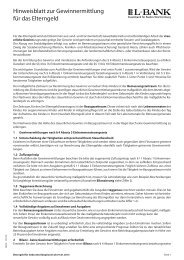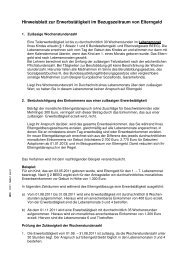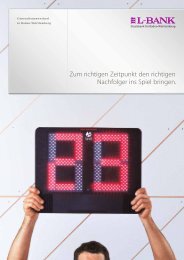Landeskreditbank Baden-Württemberg - L-Bank
Landeskreditbank Baden-Württemberg - L-Bank
Landeskreditbank Baden-Württemberg - L-Bank
You also want an ePaper? Increase the reach of your titles
YUMPU automatically turns print PDFs into web optimized ePapers that Google loves.
THE CLEARING SYSTEMS<br />
DTC<br />
DTC is a limited-purpose trust company organized under the New York <strong>Bank</strong>ing Law, a “banking<br />
organization” within the meaning of the New York <strong>Bank</strong>ing Law, a member of the Federal Reserve System, a<br />
“clearing corporation” within the meaning of the New York Uniform Commercial Code and a “clearing agency”<br />
registered pursuant to the provisions of Section 17A of the United States Securities Exchange Act of 1934, as<br />
amended (the “Exchange Act”). DTC was created to hold securities for DTC participants and to facilitate the<br />
clearance and settlement of securities transactions, such as transfers and pledges, between DTC participants<br />
through electronic computerized book-entry changes in accounts of DTC participants, which thereby eliminates<br />
the need to physically move securities certificates. DTC participants include certain of the U.S. depositaries,<br />
securities brokers and dealers, banks, trust companies and clearing corporations and certain other organizations.<br />
DTC is owned by a number of DTC participants and by The New York Stock Exchange, Inc., the American<br />
Stock Exchange, Inc., and the National Association of Securities Dealers, Inc. Indirect access to the DTC system<br />
is also available to others, such as banks, securities brokers, dealers and trust companies that clear through or<br />
maintain a custodial relationship with a DTC participant, either directly or indirectly (“indirect DTC<br />
participants”). Persons who are not DTC participants may beneficially own securities held by DTC only through<br />
DTC participants or indirect DTC participants. The rules that apply to DTC and DTC participants are on file with<br />
the U.S. Securities and Exchange Commission.<br />
Transfers of beneficial interests in notes in DTC may be made only through DTC participants. Indirect DTC<br />
participants are required to effect transfers through a DTC participant. In addition, beneficial owners of notes in<br />
DTC will receive all distributions of principal of and interest on the notes from the paying agent through a DTC<br />
participant. Distributions in the United States will be subject to tax reporting in accordance with relevant United<br />
States laws and regulations as set forth in “United States Federal Income Taxation” contained in our most recent<br />
annual report filed with the Securities and Exchange Commission on Form 18-K.<br />
Because DTC can only act on behalf of DTC participants, who in turn act on behalf of indirect DTC<br />
participants, and because beneficial owners will hold interests in the notes through DTC participants or indirect<br />
DTC participants, the ability of such beneficial owners to pledge notes to persons or entities that do not<br />
participate in DTC, or otherwise take actions with respect to such notes, may be limited.<br />
The established procedures of DTC provide that (i) upon issuance of the notes by us, DTC will credit the<br />
accounts of DTC participants designated by the joint lead managers (as defined in “Plan of Distribution”) with<br />
the principal amount of the notes purchased by the managers, and (ii) ownership of interests in the DTC global<br />
certificate will be shown on, and the transfer of that ownership will be effected only through, records maintained<br />
by DTC, the DTC participants and the indirect DTC participants. The laws of some jurisdictions require that<br />
certain persons take physical delivery in definitive form of securities, which they own. Consequently, the ability<br />
to transfer beneficial interests in the DTC global certificate is limited to such context.<br />
CBL<br />
CBL is incorporated under the laws of Luxembourg. CBL holds securities for its participating organizations<br />
and facilitates the clearance and settlement of securities transactions between CBL participants through<br />
electronic book-entry changes in accounts of CBL participants, thereby eliminating the need for physical<br />
movement of certificates. Transactions may be settled in CBL in various currencies, including Euros. CBL<br />
provides to CBL participants, among other things, services for safekeeping, administration, clearance and<br />
settlement of internationally traded securities and securities lending and borrowing. CBL interfaces with<br />
domestic markets in several countries. As a professional depositary, CBL is subject to regulation by the Central<br />
<strong>Bank</strong> of Luxembourg.<br />
CBL participants are recognized financial institutions around the world, including managers, securities<br />
brokers and dealers, banks, trust companies, clearing corporations and certain other organizations and may<br />
S-10



